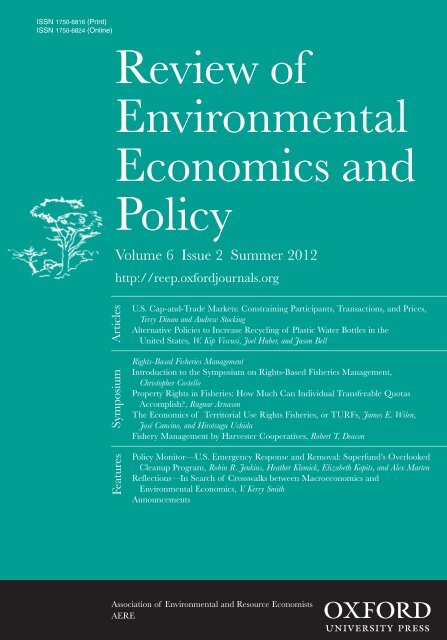The Use of Group-Level Approaches to Environmental and Natural Resource Policy
IF 6.6
3区 经济学
Q1 ECONOMICS
引用次数: 12
Abstract
Policies to address environmental and natural resource management are often implemented at the group level. The defining feature of such policies is that penalties or rewards are based on group rather than individual performance, or rights are allocated to a group rather than to individuals. This article discusses how group-level policies have been applied and studied across a variety of contexts in the literature on environmental and natural resource management. The aim is to identify common theoretical and empirical insights and lessons learned about the design and implementation of these instruments. A general finding is that group-level policies are most likely to be effective when rewards and/or penalties are designed to provide strong incentives for groups to meet targets in a cost-effective way. Moreover, to the extent that this requires coordination within the group, the effectiveness of policies will depend on whether the group has or can create its own institutions or mechanisms to facilitate and enforce that coordination.集团层面方法在环境和自然资源政策中的应用
处理环境和自然资源管理的政策通常在集团一级执行。这种政策的决定性特征是,惩罚或奖励是基于群体而非个人表现,或者权利是分配给群体而不是个人的。本文讨论了在环境和自然资源管理文献中,如何在各种背景下应用和研究群体层面的政策。其目的是确定关于这些文书的设计和实施的共同理论和经验见解以及经验教训。一个普遍的发现是,当奖励和/或惩罚旨在为集团以具有成本效益的方式实现目标提供强有力的激励时,集团层面的政策最有可能有效。此外,如果这需要集团内部的协调,政策的有效性将取决于集团是否拥有或能够建立自己的机构或机制来促进和加强这种协调。
本文章由计算机程序翻译,如有差异,请以英文原文为准。
求助全文
约1分钟内获得全文
求助全文
来源期刊
CiteScore
10.80
自引率
0.00%
发文量
25
期刊介绍:
The Review of Environmental Economics and Policy fills the gap between traditional academic journals and the general interest press by providing a widely accessible yet scholarly source for the latest thinking on environmental economics and related policy. The Review publishes symposia, articles, and regular features that contribute to one or more of the following goals: •to identify and synthesize lessons learned from recent and ongoing environmental economics research; •to provide economic analysis of environmental policy issues; •to promote the sharing of ideas and perspectives among the various sub-fields of environmental economics;

 求助内容:
求助内容: 应助结果提醒方式:
应助结果提醒方式:


